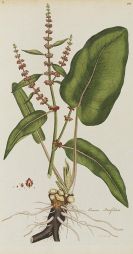
Immanuel Kant
Königsberg
1724 -
Königsberg
1804
The eminent philospher Immanuel Kant was born on April 22, 1724 in Königsberg, Prussia. In 1732 Kant attended the "Friedrichskollegium" and received there an intense education. He began studying theology at the University in Königsberg in 1740.
His interests turned quickly to the natural sciences, and, with the help of his professors, he worked through the teachings of Leibnitz and Newton. In 1748 Kant temporarily broke off his studies, because his dissertation "Thoughts on the True Estimation of Living Forces " ("Gedanken von der wahren Schätzung der lebendigen Kräfte") was not accepted.
He returned to Königsberg in 1754 to continue his studies. In 1755 Kant's work, "General History of Nature and Theory of the Heavens" ("Allgemeine Naturgeschichte und Theorie des Himmels") was published. At this time Immanuel Kant became assistent professor in Königsberg, teaching logic, metaphyics, anthropology, moral philosophy, natural theology, mathematics, physics, mechanics, geography, pedagogy, and natural justice. His lectures were attended with great interest. Kant declined the offer to assume the chair of Poetry in 1762.
In his 1762 treatise "The Only Possible Argument in Support of a Demonstration of the Existence of God" ("Der einzige mögliche Beweisgrund zu einer Demonstration des Daseins Gottes"), Kant attempted to prove that all previous proofs of the existence of God were unsatisfactory. "De mundi sensibilis atque intelligibilis forma et principiis" ("On the Form and Principles of the Sensible and Intelligible World") appeared in 1770.
Also in that year, Immanuel Kant was given the postion of Professor of Logic and Metaphysics at the University of Königsberg.
When he published "Critique of Pure Reason" ("Kritik der reinen Vernunft") in 1781, Kant's philosophy had fundamentally changed. His "Prolegomena," published in 1783, was to be a generally understandable introduction to critical philosophy. Kant completed his ethical system, which was only hinted at in the last chapters of "Critique of Pure Reason," in 1785 in "Groundwork on the Metaphysics of Morals" ("Grundlegung zur Metaphysik der Sitten"). In the years 1786 and 1788, Immanuel Kant occupied the office of Rector at the University of Königsberg.
In 1787, Kant was inducted into the Academy of Sciences in Berlin. Kant spent much time constantly battling the censors, until 1796, when Kant was only allowed to continue teaching with the understanding that he keep his religious writings to himself, because they spread deistic and socianistic ideas which were not compatible with the Bible.
Immanuel Kant died in Königsberg on February 2, 1804.
Would you like to sell a work by Immanuel Kant?
Infos for seller


